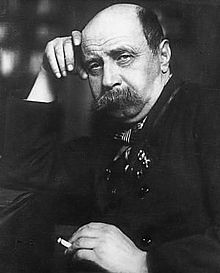Peter Altenberg
| Peter Altenberg | |
|---|---|

Altenberg in 1907
|
|
| Born | Richard Engländer 9 March 1859 Vienna, Austria |
| Died | 19 January 1919 (aged 59) Vienna, Austria |
| Occupation | Writer |
| Nationality | Austrian |
| Literary movement | Modernism |
|
|
|
| Signature |  |
Peter Altenberg (9 March 1859 – 8 January 1919) was a writer and poet from Vienna, Austria. He was key to the genesis of early modernism in the city.
He was born Richard Engländer on 9 March 1859 in Vienna. The nom de plume, "Altenberg", came from a small town on the Danube river. Allegedly, he chose the "Peter" to honor a young girl whom he remembered as an unrequited love (it had been her nickname). Although he grew up in a middle class Jewish family, Altenberg eventually separated himself from his family of origin by dropping out of both law and medical school, and embracing Bohemianism as a permanent lifestyle choice. He cultivated a feminine appearance and feminine handwriting, wore a cape, sandals and a broad-brimmed hat, and despised 'macho' masculinity.
Discovered by Arthur Schnitzler in 1894 and appreciated by Hugo von Hofmannsthal and Karl Kraus, Altenberg was one of the main proponents of Viennese Impressionism. He was a master of short, aphoristic stories based on close observation of everyday life events. After reading Altenberg's first published collection Wie ich es sehe (1896) Hofmannsthal wrote: "Even though entirely unconcerned with things important, the book has such a good conscience that one can immediately see that it cannot possibly be a German book. It is truly Viennese. It flaunts it – its origin – as it flaunts its attitude."
At the fin de siècle, when Vienna was a major crucible and center for modern arts and culture, Altenberg was a very influential part of a literary and artistic movement known as Jung-Wien (Young Vienna). Altenberg was a contemporary of Karl Kraus, Gustav Mahler, Arthur Schnitzler, Gustav Klimt, and Adolf Loos, with whom he had a very close relationship. He was somewhat older, in his early 30s, than the others. His oeuvre consists of short, poetic prose pieces that do not easily fit into usual formal categories.
...
Wikipedia
